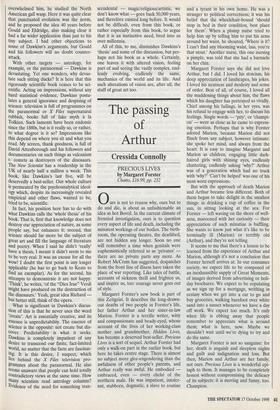The passing of Arthur
Cressida Connolly
PRECIOUS LIVES by Margaret Forster Chatto, £16.99, pp. 232 Ours is not to reason why, ours but to do and die, is about as unfashionable an idea as hot Bovril. In the current climate of frenzied investigation, ours is to question every aspect of life and death, including the minutest workings of our bodies. The birth- room, the operating theatre, the deathbed, are not hidden any longer. Soon no one will remember a time when genitals were euphemistically referred to as 'privates' there are no private parts any more. As Robert McCrum has suggested, despatches from the front line of illness have taken the place of war reporting. Like tales of battle, accounts of sickness thrill and frighten us, and inspire us, too: courage never goes out of style.
Margaret Forster's new book is part of this Zeitgeist. It describes the long-drawn- out deaths of two people in Forster's life, her father Arthur and her sister-in-law Marion. Forster is a terrific writer, witty and compassionate and beady-eyed, whose account of the lives of her working-class mother and grandmother, Hidden Lives, has become a deserved best-seller. Precious Lives is a sort of sequel. Arthur Forster had only a walk-on part in the earlier book, but here he takes centre stage. There is almost no subject more glee-engendering than the awfulness of other people's parents, and Arthur really was awful. He embodied embraced, even — every cliché of the northern male. He was impatient, intoler- ant, stubborn, dogmatic, a slave to routine and a tyrant in his own home. He was a stranger to political correctness; it was his belief that the wheelchair-bound 'should stop in bed in their condition, best place for them'. When a plump nurse tried to help him up by telling him to put his arms around her waist, he shouted, 'Where is it? I can't find any blooming waist, lass, you're that stout.' Another nurse, this one nursing a pimple, was told that she had a barnacle on her chin.
Margaret Forster says she did not love Arthur, but I did. I loved his stoicism, his deep appreciation of landscapes, his jokes. I loved his neatness and modesty and sense of order. Best of all, of course, I loved all the maddening things about him, the flaws which his daughter has portrayed so vividly. Chief among his failings, in her eyes, was his refusal to engage with her, to discuss his feelings. Single words — 'pity', or 'champi- on' — were as close as he came to express- ing emotion. Perhaps that is why Forster adored Marion, because Marion did not flinch from any subject, however intimate: she spoke her mind, and always from the heart. It is easy to imagine Margaret and Marion as children, engaging little dark- haired girls with shining eyes, endlessly chattering, endlessly asking 'why?' Arthur was of a generation which had no truck with `why?' Can't be helped' was one of his most worn expressions.
But with the approach of death Marion and Arthur became less different. Both of them began to take delight in the smallest things: in drinking a cup of coffee in the sun, in sitting looking at the sea. For Forster — left waving on the shore of well- ness, marooned with her curiosity — their appreciation of such minutiae is baffling. She wants to know just what it's like to be terminally ill (Marion) or terribly old (Arthur), and they're not telling.
It seems to me that there's a lesson to be learned from the experience of Arthur and Marion, although it's not a conclusion that Forster herself arrives at. In our consumer society, we expect life to be composed of an inexhaustible supply of Great Moments, of images derived from advertising or holi- day brochures. We expect to be copulating as we sign up for a mortgage, writhing in ecstasy when we get into a car to go and buy groceries, walking barefoot over white sand into a sunset whenever we have a day off work. We expect too much. It's only when life is ebbing away that people remember to appreciate what is around them; what is here, now. Maybe we shouldn't wait until we're dying to try and do the same.
Margaret Forster is not so sanguine: for her, death is anguish and sleepless nights and guilt and indignation and loss. But then, Marion and Arthur are her family, not ours. Precious Lives is a wonderful epi- taph to them. It manages to be completely honest without compromising the delicacy of its subjects: it is moving and funny, too. Champion.










































































 Previous page
Previous page